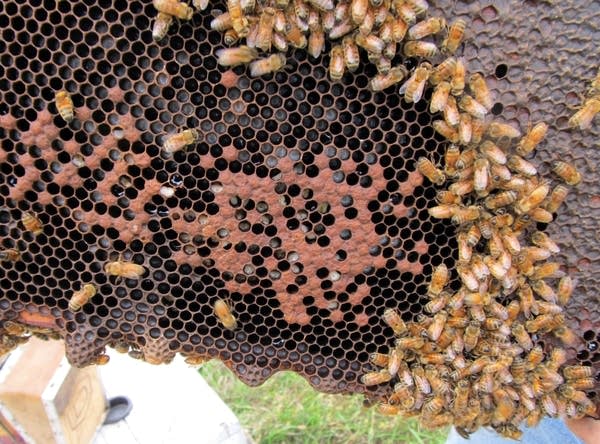Researchers, lawmakers see growing interest in protecting bees

Go Deeper.
Create an account or log in to save stories.
Like this?
Thanks for liking this story! We have added it to a list of your favorite stories.
Two Minnesota state agencies are working on ways to make the environment healthier for bees.
In a report to the Legislature on Wednesday, the state Department of Agriculture will detail its plan to review the use of a popular insecticide linked to bee deaths. Meanwhile, the state Department of Natural Resources is developing guidelines to improve the habitat for pollinating insects.
The issue is also likely to be a hot topic during the upcoming Legislative session because pollinating insects are important to agriculture. In recent years, they have become victims of a perfect storm. There are fewer flowering plants on the landscape, which affects insect nutrition. Honey bees suffer from persistent disease problems. Another serious threat comes from the neonicotinoid insecticide.
In the last several years, more than a third of the nation's honey bee population has died each year, according to estimates from the U.S. Department of Agriculture.
Turn Up Your Support
MPR News helps you turn down the noise and build shared understanding. Turn up your support for this public resource and keep trusted journalism accessible to all.
Protecting pollinating insects will be a daunting task, said University of Minnesota bee expert Marla Spivak, who is working with a new team of university scientists looking for answers.
"I just spent the morning with a bunch of epidemiologists here on the chalk board," Spivak said. "By lunch time they're looking at this thing and going, 'Oh my God, where do we begin?'"
Spivak said a growing body of scientific evidence shows that pollinating insects are affected by low levels of insecticide. But scientists still aren't sure how much insecticide bees are exposed to as they travel from plant to plant.
The Legislature, which will consider funding some of the needed research, last year ordered the Minnesota Department of Agriculture to develop a process for reviewing the safety of widely used neonicotinoid insecticides, which are absorbed by plant roots, leaves and pollen.
Neonicotinoid insecticides are used to protect Minnesota crops like corn, soybeans and sugar beets. They also are commonly used in urban settings and in greenhouse plants.
State Agriculture Commissioner Dave Frederickson also ordered a regulatory review of the insecticides. A report due to the Legislature Wednesday will outline how the year-long review will proceed.
"This has been such an issue, a contentious issue, that I just think it's incumbent on the Department of Agriculture to take a very serious look at it," Frederickson said.
The review could lead to changes in how or when the insecticide is used. Frederickson says changes will be made only if the science strongly proves a risk to pollinators. Minnesota does have authority to impose regulations that are more restrictive than federal Environmental Protection Agency rules.
Frederickson said neonicotinoids are safer for people than other types of insecticides. But he said the risk to beneficial insects can't be ignored.
"In significant doses it would be harmful to pollinators, pollinator insects," he said. "So we have to be able to learn how to manage that or otherwise we're going to have to figure out a way to replace it."
DNR officials are developing guidelines for managing habitat to best provide food and protection for pollinating insects.
Wildlife Habitat Program Manager Bob Welsh said new best management practices won't bring major changes since the DNR already manages land to create diverse habitat. But it might mean changing when grassland is burned or mowed or adding more plants that are a good food source for pollinators.
"There's a lot that we don't know about pollinators and we expect the BMP's and restoration guidelines is going to be a living breathing document and change constantly as we learn new things," he said.
Any organization receiving state money to restore grasslands will also need to follow the new guidelines.
There will be no requirements for farmers to improve pollinator habitat, but Frederickson said farmers should consider ways they can create pollinator refuges on their land.
For Spivak, the guidelines are a good start. But she also wants to see financial incentives and enforcement to make sure the guidelines are followed statewide.
"For example, if you're going to say we need to plant flowers on roadsides and not spray them," Spivak said, "then how are we going to make sure people are not spraying their roadsides?"
Despite such challenges, Spivak sees growing public support for protecting pollinating insects. She said the grassroots organization Beez Kneez in Minneapolis wants to make public now-protected pesticide applicator records in the state. She said the group also plans to encourage homeowners to stop using insecticides.
"The change is really in my mind just starting to happen," she said. "I mean we cracked open the door here. That's kind of what we've done. Let's barge through it now."
Lawmakers also are hearing about bees.
State Representative Jean Wagenius, chair of the Environment, Natural Resources and Agriculture Finance committee, is surprised by the number of calls and conversations on the topic.
"I think there's a lot of public interest," said Wagenius, DFL-Minneapolis. "There is more here than I expected and it's broader than I expected."
The public will have a chance to comment on the two departments' plans over the next few weeks. Minneapolis residents will kick off their healthy bee initiative with a public meeting Thursday night.


